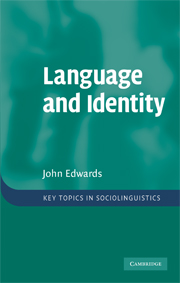Book contents
- Frontmatter
- Contents
- 1 Introduction
- 2 Identity, the individual and the group
- 3 Identifying ourselves
- 4 Language, dialect and identity
- 5 Dialect and identity: beyond standard and nonstandard
- 6 Language, religion and identity
- 7 Language, gender and identity
- 8 Ethnicity and nationalism
- 9 Assessments of nationalism
- 10 Language and nationalism
- 11 Language planning and language ecology
- Glossary
- Notes
- References
- Index
- References
10 - Language and nationalism
Published online by Cambridge University Press: 05 June 2012
- Frontmatter
- Contents
- 1 Introduction
- 2 Identity, the individual and the group
- 3 Identifying ourselves
- 4 Language, dialect and identity
- 5 Dialect and identity: beyond standard and nonstandard
- 6 Language, religion and identity
- 7 Language, gender and identity
- 8 Ethnicity and nationalism
- 9 Assessments of nationalism
- 10 Language and nationalism
- 11 Language planning and language ecology
- Glossary
- Notes
- References
- Index
- References
Summary
THE BASIC LINK
Koestler (1976: 157; see also Safran, 2008) described the descendants of the biblical tribes as ‘the classic example of linguistic adaptability’, in which a strong and continuing sense of group identity outlived repeated shifts in communicative language:
first they spoke Hebrew; in the Babylonian exile, Chaldean; at the time of Jesus, Aramaic; in Alexandria, Greek; in Spain, Arabic, but later Ladino – a Spanish-Hebrew mixture written in Hebrew characters, the Sephardi equivalent of Yiddish; and so it goes on. They preserved their religious identity, but changed languages at their convenience.
This is but a striking example of the lack of a necessary connection between the continuation of a particular, traditional or ancestral language and the maintenance of feelings of ‘groupness’. But this is not to say that, where such a language has been sustained, it is not an obvious and powerful pillar of identity. And, indeed, it is a commonly held assumption, both without and within academia, that it is the pillar, that its presence may not be sufficient but it is certainly necessary. Here is a brief selection of the sorts of sentiments commonly made by language nationalists (see Edwards, 1995; see also Fishman, 1997):
Absolutely nothing is so important for a nation's culture as its language.
(Wilhelm von Humboldt, 1797)Language is the spiritual exhalation of the nation.
(Humboldt again)Has a nation anything more precious than the language of its fathers?
(Johann Gottfried Herder, 1772)A people without a language of its own is only half a nation…to lose your native tongue…is the worst badge of conquest.
(Thomas Davis, 1843)- Type
- Chapter
- Information
- Language and IdentityAn introduction, pp. 205 - 224Publisher: Cambridge University PressPrint publication year: 2009

